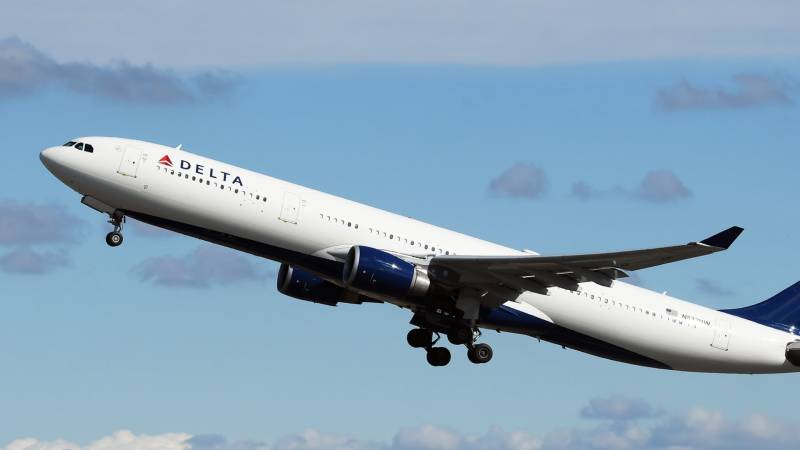This is a story about Delta Air Lines and how air travel is changing, along with a takeaway that could be very good news for your business.
In fact, this just might count as a big silver lining in the great cloud of the pandemic.
It's also part of why business leaders in all industries should pay attention to what the big airlines do and say, a concept I explain at greater length in my free ebook, Flying Business Class, which you can download here.
The airlines are among the most closely watched companies on the planet, with an army of analysts, journalists, and stakeholders tracking every move. It's like a never-ending parade of business school case studies, often covering the same issues you face in your business.
This brings us to the earnings call for Delta Air Lines this week, in which Delta announced its first quarterly profit since the pandemic, and Delta's top leaders explained a "structural" change they're seeing in their customer base.
Let's go to the transcript.
It started with analyst Conor Cunningham of MKM Partners, who asked if Delta is concerned that business travelers (historically the most important travelers for airlines; the ones whose employers pay for things like premium business and first-class travel) might not return, post-pandemic.
As Cunningham put it: "[H]ow do you think about the premium cabin as demand starts to normalize? Do you think the changes are now structural? Or is it really just too early to tell[?]"
Here's part of what Delta president Glen Hauenstein had to say:
"We believe they're structural. And we believe that -- through the pandemic, we've created kind of a new class of customer, which is the high-end consumer that wants these products that maybe didn't have as much access to them because they were given to the business customer earlier in the booking process."
And here's what Delta CEO Ed Bastian added, immediately afterward:
"Consumers are looking at travel differently, and they're looking at a lot of things differently in a post-pandemic world. And the quality of their provider, the care in which their provider takes to them, it doesn't matter whether you're an airline or a hotel or a restaurant, whatever you are, is continuing going to drive preference and drive influence at a higher level than ever before."
If we can cut through the corporate-speak and airline-specific references, here's what this means:
Yes, business travel is down and will probably stay down for a while.
But, there's also a rise in a new kind of customer: an individual consumer who is now willing to pay for premium service, even though he or she doesn't have a corporate employer footing the bill.
That alone could be intriguing for almost any business. But, I have a theory that goes beyond what Delta revealed on the call.
If your business can leverage it--again, almost no matter what industry you are in--the possibilities will be very attractive.
It all has to do with the fact that during the Great Resignation, millions of Americans walked away from traditional jobs, but many of them did not look for other jobs.
Instead, millions of these people left to launch their own businesses, or else to try to turn side hustles into full-time, profit-producing efforts.
For example, last month Digital.com said it did a survey that suggested fully 32 percent of Americans who left jobs this year did so in order to start their own businesses.
So, yes, Delta might well be right in terms of a theory that individual "high-end consumer[s]" are driving demand for premium products like business-class travel.
But, I think it's also likely that there are now many new smaller businesses and newly self-employed people, who are traveling for business.
They might not have employers who will pay for upgraded service, but they still can often take tax deductions on legitimate business travel. There's also the qualitative advantage that a higher level of air service can leave you more ready to actually engage in business when you land.
This idea struck close to home for me when I heard Hauenstein and Bastian's remarks. Because, I realized that I am one of the new kinds of passengers they're talking about.
After hardly flying at all during the pandemic, I now have four big trips scheduled for over the next few months. Without thinking of myself as part of a trend, I did something I don't think I've ever done before when I was footing the bill for my own travel:
On shorter flights, both for business and personal travel, I found myself looking at premium economy tickets.
On redeye transcontinental and transatlantic flights -- which are 100 percent related to business travel for me -- I found myself paying for lie-flat seats in business class, so that I could be pretty sure I'd get at least a partial night of sleep on the plane.
Now, for Delta and other airlines, this trend might turn out to be a bit more complicated.
For one thing, it's an open question whether "classic" business travel will return in similar numbers in the short or medium term, and also whether this "new class of customer" will offset the loss completely.
But if you're running a business in almost any industry, I wonder if you'll notice an uptick in these new kinds of customers, and if so, whether there are ways to peel off or add on services that might fit this new premium model.
A few ideas from someone who is obviously an outsider and doesn't know much about your business:
If you run a restaurant, would it make sense to offer guaranteed reservations during business-heavy times, or even preferred tables, for a small additional fee?
If you offer consulting services, could this be a chance to offer premium service at a higher rate or retainer, so as to book your time well in advance?
Frankly, no matter what kind of product or service you sell, is it worth considering a pivot to offer something a bit more premium, but at higher rates, on the theory that these higher-price-tolerant customers might now be out there?
I suspect a lot of businesses will figure out a lot of ways to make a lot of money if this trend really does emerge as Delta suggests. Maybe your business should be one of them.
If you give it a try and it works out for you, remember where you got the idea first.
SOURCE : Inc




